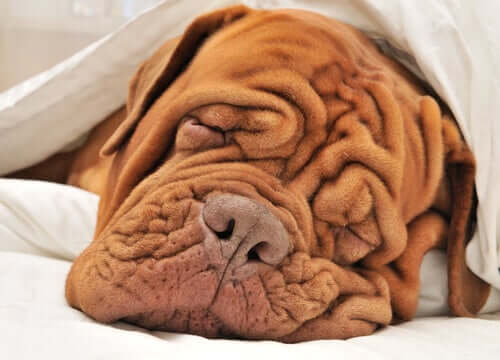The Reasons Why Dogs Snore


Written and verified by biochemistry Luz Eduviges Thomas-Romero
It’s important to understand why dogs snore. First of all, we should understand that, in many cases, snoring is perfectly normal and inoffensive.
Sometimes owners may think that it’s fun to hear their dogs snore. In other cases, they may find this bothersome–especially if they share the same room! Keep in mind that, if a dog snores while it’s awake, then you should check with a veterinarian. The same is true if your dog starts to snore while sleeping when he or she has no history of snoring.
Why do dogs snore?
Basically, dogs snore when air doesn’t flow freely through their nasal passages or throat. This can happen occasionally, for example, when your dog is sleeping on its back. In this position, your dog’s tongue can fall towards the back of its throat, which then obstructs breathing.
Don’t be quick to laugh if you hear your dog snoring. The reason can sometimes be serious.
Do some dog breeds snore more than others?
Yes, there are certain dog breeds that are more prone to snoring than others. Breeds with short muzzles or flat faces are–understandably–prone to snoring. This is because their airways are shorter and they may have a harder time moving air.
These breeds are known as brachycephalic dogs and include pugs, bulldogs, boxers, Shih Tzus, and Boston terriers. In these cases, snoring is definitely “normal”. It’s worth mentioning that, even if you have a different type of dog that isn’t brachycephalic, there’s no guarantee he or she won’t snore.
We should keep in mind that the position a dog chooses to sleep in is just as much a factor as the shape of its neck and the length of its snout. All of these factors can contribute to snoring.
So, if your dog snores, try shifting the position of its body and see if things improve. At the same time, elevating your dog’s head can also reduce snoring. So, giving your dog a pillow to rest its head-on can be a helpful solution.
Another suggestion that can be effective is to use a humidifier. This increases the humidity in the air and can help canines sleep much better. If your dog’s snoring becomes worrisome, then you should consult with a doctor about the possibility of surgical intervention.
When dogs snore, it may have to do with their weight
Another common cause of a dog’s snoring is obesity. It’s important to recognize that, when a dog is overweight or morbidly obese, extra fat can accumulate in the throat. This extra tissue can block a dog’s airways and lead to breathing problems.

Allergies can also be the reasons dogs snore
Just like any human being, dogs can be allergic to dust, pollen, perfumes, and the dander of other animals. These allergies can make breathing difficult and contribute to snoring.
If the cause behind your dog’s snoring is allergies, then you should wash your pet’s bedding every day. Vacuum your home on a regular basis and use an air filter. Finally, spend time with your dog walking outdoors when pollen levels and road traffic are low.
Snoring and dental problems
It’s important to know that abscesses or any growth or mass in the oral cavity or paranasal sinuses can cause snoring. If an infection doesn’t receive proper treatment, it can spread throughout your pet’s body and lead to much more serious problems. Therefore, be sure to look at your dog’s mouth on a regular basis and stay alert for infections of the teeth and gums.

Nasal obstructions respiratory airways
There’s also a chance that your dog has a foreign object stuck in its nose, causing the animal’s snoring. This could be, for example, a piece of your pet’s favorite toy, seeds from grass, or other plant material he or she’s found while outdoors.
If your dog is sneezing often or rubs its nose repeatedly, something may be stuck inside. Also, a blockage may also be accompanied by nasal secretions. Therefore, take a look and, if you think something’s stuck in your dog’s nose, you should probably take your pet to the veterinarian to have it removed.
It’s important to understand why dogs snore. First of all, we should understand that, in many cases, snoring is perfectly normal and inoffensive.
Sometimes owners may think that it’s fun to hear their dogs snore. In other cases, they may find this bothersome–especially if they share the same room! Keep in mind that, if a dog snores while it’s awake, then you should check with a veterinarian. The same is true if your dog starts to snore while sleeping when he or she has no history of snoring.
Why do dogs snore?
Basically, dogs snore when air doesn’t flow freely through their nasal passages or throat. This can happen occasionally, for example, when your dog is sleeping on its back. In this position, your dog’s tongue can fall towards the back of its throat, which then obstructs breathing.
Don’t be quick to laugh if you hear your dog snoring. The reason can sometimes be serious.
Do some dog breeds snore more than others?
Yes, there are certain dog breeds that are more prone to snoring than others. Breeds with short muzzles or flat faces are–understandably–prone to snoring. This is because their airways are shorter and they may have a harder time moving air.
These breeds are known as brachycephalic dogs and include pugs, bulldogs, boxers, Shih Tzus, and Boston terriers. In these cases, snoring is definitely “normal”. It’s worth mentioning that, even if you have a different type of dog that isn’t brachycephalic, there’s no guarantee he or she won’t snore.
We should keep in mind that the position a dog chooses to sleep in is just as much a factor as the shape of its neck and the length of its snout. All of these factors can contribute to snoring.
So, if your dog snores, try shifting the position of its body and see if things improve. At the same time, elevating your dog’s head can also reduce snoring. So, giving your dog a pillow to rest its head-on can be a helpful solution.
Another suggestion that can be effective is to use a humidifier. This increases the humidity in the air and can help canines sleep much better. If your dog’s snoring becomes worrisome, then you should consult with a doctor about the possibility of surgical intervention.
When dogs snore, it may have to do with their weight
Another common cause of a dog’s snoring is obesity. It’s important to recognize that, when a dog is overweight or morbidly obese, extra fat can accumulate in the throat. This extra tissue can block a dog’s airways and lead to breathing problems.

Allergies can also be the reasons dogs snore
Just like any human being, dogs can be allergic to dust, pollen, perfumes, and the dander of other animals. These allergies can make breathing difficult and contribute to snoring.
If the cause behind your dog’s snoring is allergies, then you should wash your pet’s bedding every day. Vacuum your home on a regular basis and use an air filter. Finally, spend time with your dog walking outdoors when pollen levels and road traffic are low.
Snoring and dental problems
It’s important to know that abscesses or any growth or mass in the oral cavity or paranasal sinuses can cause snoring. If an infection doesn’t receive proper treatment, it can spread throughout your pet’s body and lead to much more serious problems. Therefore, be sure to look at your dog’s mouth on a regular basis and stay alert for infections of the teeth and gums.

Nasal obstructions respiratory airways
There’s also a chance that your dog has a foreign object stuck in its nose, causing the animal’s snoring. This could be, for example, a piece of your pet’s favorite toy, seeds from grass, or other plant material he or she’s found while outdoors.
If your dog is sneezing often or rubs its nose repeatedly, something may be stuck inside. Also, a blockage may also be accompanied by nasal secretions. Therefore, take a look and, if you think something’s stuck in your dog’s nose, you should probably take your pet to the veterinarian to have it removed.
All cited sources were thoroughly reviewed by our team to ensure their quality, reliability, currency, and validity. The bibliography of this article was considered reliable and of academic or scientific accuracy.
- Lafrentz, J. R., Brietzke, S. E., & Mair, E. A. (2003). Evaluation of palatal snoring surgery in an animal model. Otolaryngology—Head and Neck Surgery, 129(4), 343-352.
- Riecks, T. W., Birchard, S. J., & Stephens, J. A. (2007). Surgical correction of brachycephalic syndrome in dogs: 62 cases (1991–2004). Journal of the American Veterinary Medical Association, 230(9), 1324-1328.
- Bach, J. F., Rozanski, E. A., Bedenice, D., Chan, D. L., Freeman, L. M., Lofgren, J. L., … & Hoffman, A. M. (2007). Association of expiratory airway dysfunction with marked obesity in healthy adult dogs. American journal of veterinary research, 68(6), 670-675.
This text is provided for informational purposes only and does not replace consultation with a professional. If in doubt, consult your specialist.








